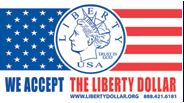|
|
Money For NothingJacob Halbrooks Children are taught that money and wealth are equivalent. It is not surprising then that a common question, when learning about government and the national debt, is why doesn't the government just print a bunch of money? The question may seem easily dismissed at first, but further analysis will show some interesting answers and consequences. When a country operates on a fiat paper currency, the amount of money in circulation is dictated by the central bank. If the government can obtain this newly printed money, then it could very well reap the benefits of inflation. Inflation is a form of taxation that transfers wealth from the individuals who last obtain the new money to those who can spend it first. By borrowing from the quasi-public Federal Reserve, the federal government could do away with all other taxes. So why doesn't this happen? The answer is that the government prefers this tax to be hidden. If the government funded itself solely through inflation, there would be dire economic consequences. Foremost, hyperinflation and the crack-boom would become much more likely. The people would see continuously rising prices and rush to get rid of the devalued money. The people would not put up with such a form of taxation for long, and private metal-backed currency might become popular. The government, of course, does not want to back away from such a lucrative tax, but at the same time it must show some restraint. As a result, other taxes are introduced to divert attention from the money presses. It is not a coincidence that the Federal Reserve was created at the same time the federal income tax was introduced. The inflation/income tax tandem is a brilliant mechanism for maximum taxation, and the two are part of the same creature. The income tax serves four purposes: to hide the insidious inflation tax, to hedge against the price effects of inflation, further wealth confiscation, and a tool for liberals to redistribute wealth. The income tax hides inflation because nearly all public policy debate on taxation is focused upon it. Politicians can point to a slight decrease in the tax rate as money they are "giving back" to the people, but if government spending keeps increasing, where does the money come from? The people see a $300 rebate check, but they don't see the money that is taken from them when the government simply borrows more money from the Fed. In order to help keep prices from soaring, the government needs to siphon off the newly created money after it is spent by the government but before it can be spent by the majority of people. To accomplish this feat, the income tax is taken from withheld wages so that workers never get a chance to hold their money. Again, they may complain about the money they see taken each week, but rarely will they connect government revenue with the dollars that are continuously devalued. Furthermore, the progressive nature of the income tax creates a disincentive for earning more money, thus keeping socially-conscious liberals happy. Libertarians often focus their energy on attacking the income tax, but many of them have been fooled as well by the smoke and mirrors of the government. It does not matter one bit whether the income tax is repealed if the government continues to fund itself through inflation. One way or another, wealth is going to be stolen from the people. Debate should therefore focus on the root of the problem, which is a fiat money supply and the Federal Reserve (or if you like, the very existence of government). Historically, inflation has been the means by which the government funds its welfare/warfare state, and the income tax is just one component, though a large one, of the inflation machine. Austrian economists have demonstrated that there is no benefit for an increasing money supply. No benefit, of course, to the majority of people who use the money, but much benefit to those who create the money. Money is the medium of exchange for nearly all trades, and it is the very lifeblood of the economy. The government that controls the money supply therefore has great influence on the economy, and the result, aside from a continuously devalued dollar and wealth confiscation, is a cycle of booms and recessions. If the country operated on a sound currency, it is likely that prices for goods would actually decrease over time, and there would be no way for any entity to silently steal from the people. Interest rates, which reflect the time-preference of capital formation versus consumption, would be dictated by the natural forces of the economy, and the business cycle would die out. Instead, we are saddled with a system that distorts the true wishes of millions of people voluntarily interacting and enriches a few privileged bankers and politicians at the expense of the people. The Federal Reserve must be abolished. |

